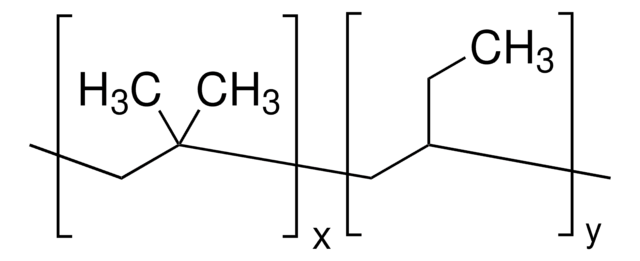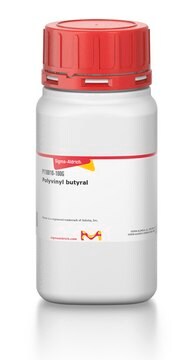181463
Polyisobutylene
average Mw ~1,000,000, average Mn ~600,000 by GPC/MALLS, average Mv ~1,200,000
About This Item
Productos recomendados
form
solid (or Chunk(s))
mol wt
average Mn ~600,000 by GPC/MALLS
average Mv ~1,200,000
average Mw ~1,000,000
contains
500 ppm BHT as stabilizer
color
colorless, or white
refractive index
n20/D 1.51
density
0.92 g/mL at 25 °C (lit.)
SMILES string
CC(C)=C
InChI
1S/C4H8/c1-4(2)3/h1H2,2-3H3
Inchi Key
VQTUBCCKSQIDNK-UHFFFAOYSA-N
¿Está buscando productos similares? Visita Guía de comparación de productos
Application
- The use of polyisobutylene-based polymers in ophthalmology: Discusses the application of polyisobutylene-based polymers in ophthalmologic devices, highlighting its potential in biomedical applications (L Pinchuk, 2022).
- Synthesis of a polyisobutylene-tagged fac-Ir (ppy) 3 complex and its application as recyclable visible-light photocatalyst in a continuous flow process: Presents a novel use of polyisobutylene as a support for photocatalysts, enhancing recyclability and efficiency in light-driven chemical reactions (D Rackl, P Kreitmeier, O Reiser, 2016).
- Polyisobutylene-based thermoplastic elastomers for manufacturing polymeric heart valve leaflets: In vitro and in vivo results: Explores the use of polyisobutylene-based elastomers in the production of heart valve leaflets, assessing their physical properties and compatibility (E Ovcharenko et al., 2019).
- Polyisobutylene—new opportunities for medical applications: Reviews the potential of polyisobutylene in various medical applications, focusing on its properties and benefits for healthcare materials (D Barczikai et al., 2021).
- Homogeneous and heterogeneous catalysts for the synthesis of highly reactive polyisobutylene: discovery, development and perspectives: Discusses advancements in catalyst technology for producing high-reactivity polyisobutylene, crucial for high-performance materials (IV Vasilenko, SV Kostjuk, 2021).
Storage Class
10 - Combustible liquids
wgk_germany
WGK 3
flash_point_f
Not applicable
flash_point_c
Not applicable
ppe
Eyeshields, Gloves
Certificados de análisis (COA)
Busque Certificados de análisis (COA) introduciendo el número de lote del producto. Los números de lote se encuentran en la etiqueta del producto después de las palabras «Lot» o «Batch»
¿Ya tiene este producto?
Encuentre la documentación para los productos que ha comprado recientemente en la Biblioteca de documentos.
Los clientes también vieron
Nuestro equipo de científicos tiene experiencia en todas las áreas de investigación: Ciencias de la vida, Ciencia de los materiales, Síntesis química, Cromatografía, Analítica y muchas otras.
Póngase en contacto con el Servicio técnico








